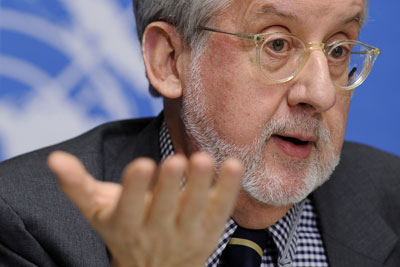Paulo Pinheiro, the chair of the International Commission of Inquiry on the Syrian Arab Republic, is a seasoned diplomat trained in the tradition of Brazil’s foreign affairs ministry, Itamaraty, with its celebrated emphasis on impartial mediation, dialogue, and strong skepticism toward foreign intervention to resolve international conflicts.
However, during a meeting Thursday in the Brussels office of the United Nations, he could not hide his indignation over attacks against civilians in Syria. As his report clearly establishes, these abuses are carried out by governmental forces, “with the apparent knowledge and consent of the highest levels of the state,” as well as by anti-government armed groups, “although their abuses are not comparable in scale and organization with those carried out by the state.”
Pinheiro also sharply criticized the Syrian government’s policy toward the media. “I am really concerned by the lack of access for the international media,” he told a small group of journalists. “The situation is all the more worrying since journalists who work underground run additional risks. I talked recently to the correspondent of the Brazilian daily O Estado de Sao Paulo, who sneaked over the border from Jordan, and I was really relieved when I heard that he was back in Geneva.”
CPJ research shows that eight local and international journalists have been killed on duty in Syria since November, at least five in circumstances that raise questions about government culpability. A CPJ review of the fatalities found substantial evidence that two local journalists, Ferzat Jarban and Basil al-Sayed, were directly targeted by government forces. In addition, circumstantial evidence and witness statements point to the possibility that government forces may have taken deliberate, hostile action against the press that led to the deaths of three international journalists, Gilles Jacquier, Marie Colvin and Rémi Ochlik.
The diplomat refrained from directly attributing responsibility for the killing of journalists to the Syrian state. “The Syrian government does not do anything to protect journalists but we cannot prove that these journalists have been directly targeted,” he said. “In fact some of these deaths [Colvin, Ochlik] occurred after we had ended our mission.”
Published on February 22, the 24-page report of the International Commission devotes a special section to denouncing the “severe restrictions on freedom of expression and information,” such as the arbitrary arrest and detention of journalists and bloggers, and refers to CPJ reports of killings, “two of which were attributed to State forces.” It also highlights the death of French TV journalist Gilles Jacquier on January 11, and underlines that “the government and the Free Syrian Army exchanged accusations over responsibility for the incident.”
However, he said the commission is committed to going beyond the “he said/she said” statements. “As our mandate will likely be renewed,” Pinheiro told us, “we must make a more thorough analysis of what effectively happened to these journalists.”
CPJ has documented dozens of cases of journalists missing or arrested for their work in Syria as well as foreign journalists expelled. Most recently, two Turkish journalists, Adem Özköse and Hamit Coşkun, were reported missing this week and are believed to be in government custody.
Although the Commission advocates for dialogue as a solution to the conflict it has also triggered the mechanism of international justice. “In the meantime,” the report states, “thorough monitoring of the situation of human rights needs to be continued and evidence of international crimes and other gross violations systematically collected to facilitate the process of holding those responsible for such acts accountable.”
“We have identified a list of people who could be indicted for crimes against humanity,” Pinheiro said. “This list has been placed in a safe and in a briefcase with two locks, each one of them given to a different person.” The day when it will be opened by the U.N. High Commissioner for Human Rights, this list might be a first step in the fight against impunity for the crimes committed in a country that has largely sealed its borders to independent reporters.
